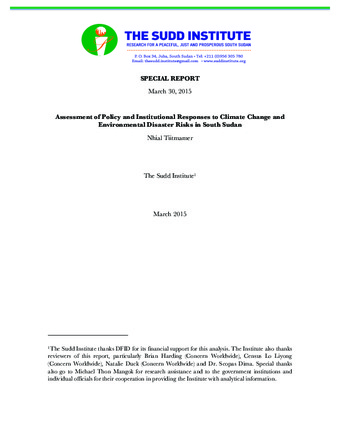Assessment of Policy and Institutional Responses to Climate Change and Environmental Disaster Risks in South Sudan
Publication Summary
This report examines policy and institutional response to climate change and environmental disaster risks, with the view to providing recommendations to the government and its partners in South Sudan on where to focus their environmental policy interventions. To get a sense of the policy and institutional measures, we interviewed key government officials and examined legal and policy documents on environment, disaster management, food security, seeds, agriculture and livestock, fisheries, forestry, wildlife, land, electricity and petroleum and related institutional frameworks in target areas.
Climate change has increased the frequency of severe droughts, floods, storms and cyclones in various parts of the world (IPCC 2007, IPCC 2012, IPCC 2013, Meadowcroft, 2009). In South Sudan, seasonal patterns have become erratic and rain-fed agricultural areas have decreased significantly in the northern and eastern parts of the country (Funk et al., 2011). Rainfalls have decreased in South Sudan by 10-20 % and temperatures have increased by more than 1 ºC since the middle of the 1970s. These rainfall and temperature changes are linked to increase in atmospheric Carbon Dioxide (CO2) since the industrial revolution (IPCC, 2013, IPCC, 2012, the Royal Society and the US National Academy of Sciences, 2014). The atmospheric CO2 has worldwide increased by 40% since the industrial revolution, and about 70% of this has been emitted since the mid-1970s (ibid).
Observations suggest that patterns in which floods and droughts occur in the same season have become widespread, with droughts happening earlier in the season around May/June and floods occurring later around August/September in South Sudan. These climatic shocks have wider negative impacts on people in terms of food security, health, and safety needs. The government and relevant actors can develop policy and institutional measures to address these shocks.
Nhial Tiitmamer has served as the Director of the Environment and Natural Resources Program at The Sudd Institute where he is currently on leave to work with United Nations in South Sudan (UNMISS). He has served as an Adjunct Assistant Professor at the University of Juba where he has taught Environmental Economics, Natural Resources Economics and Environmental Sociology. Between November 2021 and November 2022, Nhial worked as Senior Environment Associate with the United Nations High Commissioner for Refugees (UNHCR) in Juba. Before returning from Canada in 2013, Nhial worked at Arletta Environmental Consulting in Calgary and at University of Alberta’s Augustana Campus in Camrose in Alberta, Canada. Nhial’s research focusses on natural resources governance, environmental protection, climate change, and sustainable energy. He was awarded in May 2023 by the Board of Directors of The Sudd Institute with Research Impact Award for policy impacts. Nhial holds a B.A. in Environmental Studies with a minor in English Literature from the University of Alberta and an M.Sc. in Sustainable Energy Development from the University of Calgary in Alberta, Canada.

